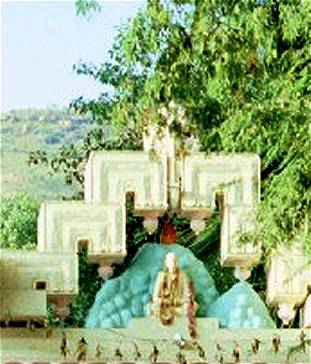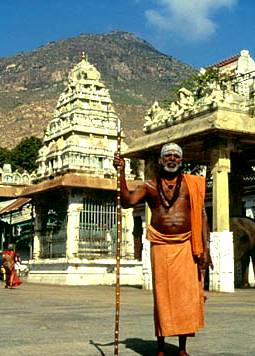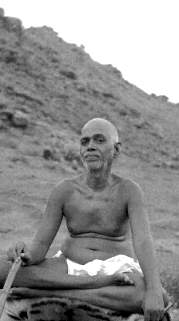|
|
|
Eternal Bhagavan, Shantammal |
|
|
|
 |
Teachings of the MaharshiThe jiva itself is Shiva;Shiva Himself is the jiva. It is true that the jiva is no other than Shiva. When the grain is hidden inside the husk, it is called paddy; when it is de-husked, it is called rice. Similarly, so long as one is bound by karma one remains a jiva; when the bond of ignorance is broken, one shines as Shiva, the Deity. Thus declares a scriptural text. Accordingly, the jiva which is mind is in reality the pure Self; but, forgetting this truth, it imagines itself to be an individual soul and gets bound in the shape of mind. From: Self Inquiry, A Discussion with Sri Ramana Maharshi |  |
 At the same moment I felt overcome by some strong power in the hall, as if an invisible wind was pushing violently against me. For a moment I felt dizzy. Then I recovered myself. I was able to look around the hall, but my gaze was drawn to Bhagavan, who was sitting absolutely straight in the Buddha posture looking directly in front of him. His eyes did not blink or in any way move. As he sat there he seemed like a statue, and yet something extraordinary emanated from him. I had a feeling that on some invisible level I was receiving spiritual shocks from him, although his gaze was not directed toward me. He did not seem to be looking at anything, and yet I felt he could see and was conscious of the whole world.
At the same moment I felt overcome by some strong power in the hall, as if an invisible wind was pushing violently against me. For a moment I felt dizzy. Then I recovered myself. I was able to look around the hall, but my gaze was drawn to Bhagavan, who was sitting absolutely straight in the Buddha posture looking directly in front of him. His eyes did not blink or in any way move. As he sat there he seemed like a statue, and yet something extraordinary emanated from him. I had a feeling that on some invisible level I was receiving spiritual shocks from him, although his gaze was not directed toward me. He did not seem to be looking at anything, and yet I felt he could see and was conscious of the whole world. |
How to Pray for OthersI once asked Bhagavan how to pray for other people. He answered, "If you are abiding within the Self, there are no other people. You and I are the same. When I pray for you I pray for myself and when I pray for myself I pray for you. Real prayer is to abide within the Self. This is the meaning of Tat Twam Asi - That Thou Art. There can be no separation in the Self. There is no need for prayer for yourself or any person other than to abide within the Self."Mercedes de Acosta |
Attachment Decreases with MeditationMany times I complained to Bhagavan that I was not making any appreciable progress, bemoaning the persistence of desires. Bhagavan replied making light of my trouble: "It will all go, all in time. You need not worry. The more dhyana (meditation) one performs the more will these desires fall away." |
|
|

| |
|
Seshadri Swami explained to Mudalier that the science of the Self was very easy to comprehend and that by neglecting it Mudalier was incurring Brahma hatya, the mortal sin of slaying a brahmin. Mudalier got frightened and went to Maharshi in whom he had more faith and reported this remark. “Well said,” replied Maharshi, “You are indeed murdering Brahman by refusing to understand that you are Brahman.” |  |
 |
Teachings of the MaharshiIf anything comes your way, by reason of prarabdha (destiny based on the balance sheet of past lives) you can't help it. If you take what comes, without any special attachment and without any desire for more of it or for a repetition of it, it will not harm you by leading to further births. On the other hand, if you enjoy it with great attachment and naturally desire for more of it, that is bound to lead to more and more births."The only freedom man has is to strive for and acquire the jnana which will enable him not to identify himself with the body. The body will go through the actions rendered inevitable by prarabdha and a man is free either to identify himself with the body and be attached to the fruits of its actions, or to be detached from it and be a mere witness of its activities." |  |
|
 |
The conquest of the mind is the greatest of all conquests. It is the Divine Himself who appears as world, individual and the beyond. So abidance as the Divine at all times and in all places will result in conquering the mind. Then will you come to realize "All is the Divine; I am that Self;" and you will attain the natural state. Ribhu Gita |  |
|
Today, I find people who have never seen Bhagavan physically, never heard his voice or listened to his upadesa, sit in the Old Hall or the Samadhi Hall, oblivious of themselves, often shedding tears, and going round the hall as if impelled by some unseen force. What gives these people their experiences? As Bhagavan always said, "Is this body Bhagavan?" When somebody expressed sadness at having to go back home from the Ashram, Bhagavan said, "What am I to do? You say that this body is Bhagavan. I say that it is not. Now, if you insist, what am I to do?" To others, he would say, "Look! He says he is going to a place where I am not." These new devotees of Bhagavan are proof of all he told us. Srimati Kanakamma |
 |
"When the One is known as it is in Itself, all that has not been known becomes known". |
| Back to Cosmic Harmony Home Page | |